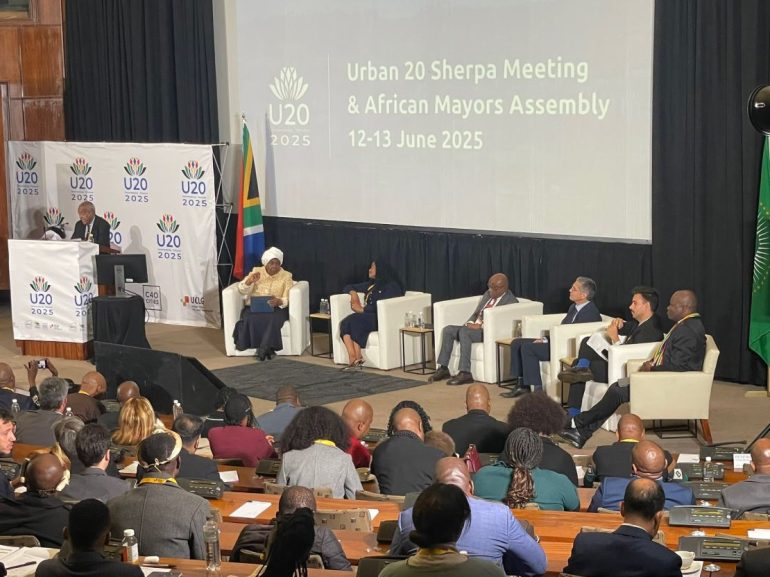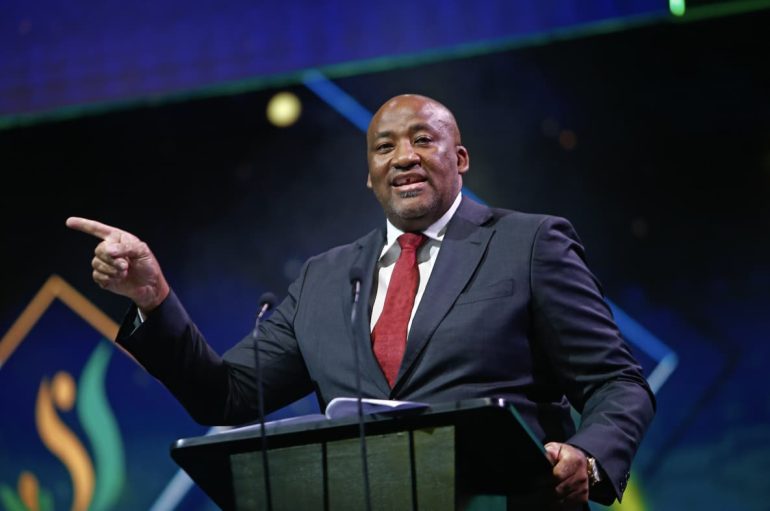

COGTA Deputy Minister, Namane Masemola, believes it is critical that authorities remain committed to conversations about climate change and finding solutions to its devastating consequences on people’s lives.
Masemola was filling COGTA minister, Velenkosini Hlabisa’s shoes at the Assembly Urban 20 African Mayors’ Assembly and and SHERPA meeting at the International Convention Center, in Pretoria, as the minister addresses the current catastrophe in the Eastern Cape caused by the recent violent floods, which have claimed at least 67 lives in that province.
Masemola highlighted the province’s recent floods and emphasised the need for authorities to develop solutions to better handle natural disasters.
“And as we continue in these discussions it is very clear that we remain committed to discuss issues relating to the impact of climate change and mainstreaming local government participation in the global biodiversity and distribution of its benefits. We also need to look at how best we can manage disasters as floods, storms, and blizzards in many parts of our country, other parts of the continents and the world at large,” says Masemola.
He also emphasises the importance of ensuring social inclusion and integration for all individuals, regardless of socioeconomic or cultural background. He also urges collective collaboration and effort among leaders.
Acting Gauteng Premier, Tasneem Motara, who is in office while Panyaza Lesufi is away on official business, says the structural legacy of apartheid has left Gauteng’s urban landscape with unique challenges, compounded by huge global trends like urbanisation.
According to Motatara, successful nations are those who can successfully anticipate and respond to the rapid global developments that the world is currently experiencing.
She predicts that Gauteng’s population will be 19 million in 2030, accounting for around 28% of the country’s population, citing the problem of rising urbanisation within the province and the need to accommodate citizens’ lifestyles.
She argues that the political-administrative nexus is critical to handle the challenge.
“The world is undergoing multiple transitions as a result of dominant mega trends such as demographic shifts, climate change, increasing levels of urbanisation and rapid technological change. Successful nations or states are those who will be able to anticipate and respond effectively to these trends,” says Motara.
She claims that the Gauteng government’s approach will be guided by an action plan designed to deliver on the province’s development ambitions, which are intended to better citizen lives.
She believes that while the province’s cities will assure growing urbanisation, they will also strive to build safe and inclusive environments for citizens.
Former African Union Chairperson, Dr Nkosazana Dlamini-Zuma, emphasises the importance of prioritising investment in the well-being of citizens in South Africa.
Dr Dlamini-Zuma, who considers citizens to be the country’s most valuable asset, believes African Renaissance is primarily a call to take ownership of South Africa’s destiny and resources.
She was addressing African Renaissance in urban settings.
Dr. Dlamini-Zuma believes African mayors have a unique potential to transform African cities into dynamic magnets of innovation and inclusivity.
She emphasises that leaders must invest in their people.
“They must be educated, skilled, and healthy. For them to be healthy, they must have decent housing, clean water, electricity, or gas. They must also be well nourished. And why do I say they are the most precious resources? Because all the things we are talking about here today can’t happen without them. They are the ones who have to build these cities,” says Dr Dlamini-Zuma.
She claims that the African Renaissance is also about social cohesiveness and inclusiveness, arguing that, unlike during the apartheid era, individuals who work in cities should be able to live there as well.
She also proposes that affordable, safe, and efficient public transportation should be implemented.
Tshwane Mayor, Dr Nasiphi Moya, reiterated Dr Dlamini-Zuma’s call for city leaders to prioritise citizens’ well-being.
Dr Moya says African city leaders must prioritise improving their cities.
She’s also warning that economic progress will be difficult in towns plagued by corruption.
She adds that economic opportunities in cities should be strategised to enable citizens sustain their lives.
She stresses that leaders need to build their institutions with honesty and humility.
“I think for me is also for us African city leaders in building the institutions that we are leading because there is no way we are going to achieve economic growth if we are leading institutions that are rife with corruption and have systems that deviate from the law. It’s just not possible,” says Dr Moya.
The Tshwane Mayor says her office aims to boost Tshwane’s GDP by about 4% over the next five years.
The city intends to infiltrate and strengthen the township’s business sector, automotive industry, and farming sector, among others. Written by Odirile Rabolao
Written by: Lindiwe Mabena
Similar posts
Current show
Upcoming shows

Sundaze with Fif_Laaa
6:00 pm - 10:00 pm

Savage Nights with Thabo X and Shamiso
10:00 pm - 12:00 am

Playground
12:00 am - 5:00 am

The Way Up with Nia Brown and Okay Wasabi
5:00 am - 9:00 am

Morning Break with Xtremme
9:00 am - 12:00 pm
Latest posts
COPYRIGHT 2023







